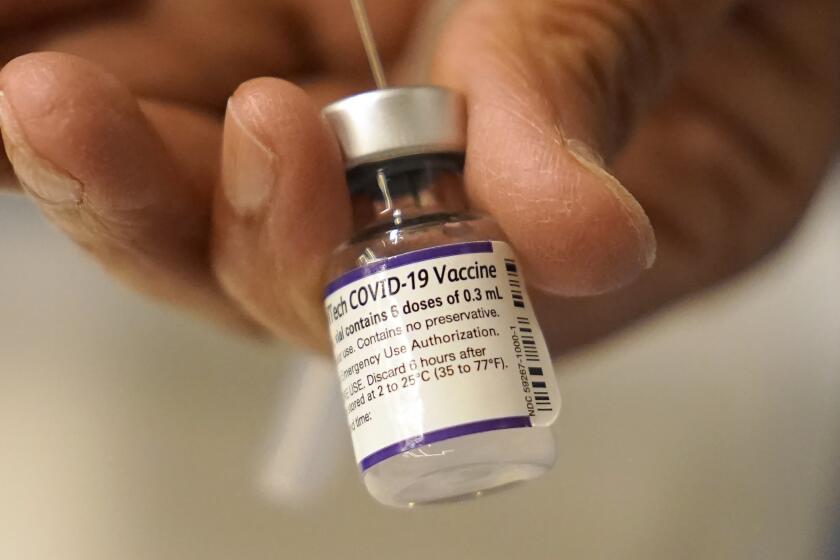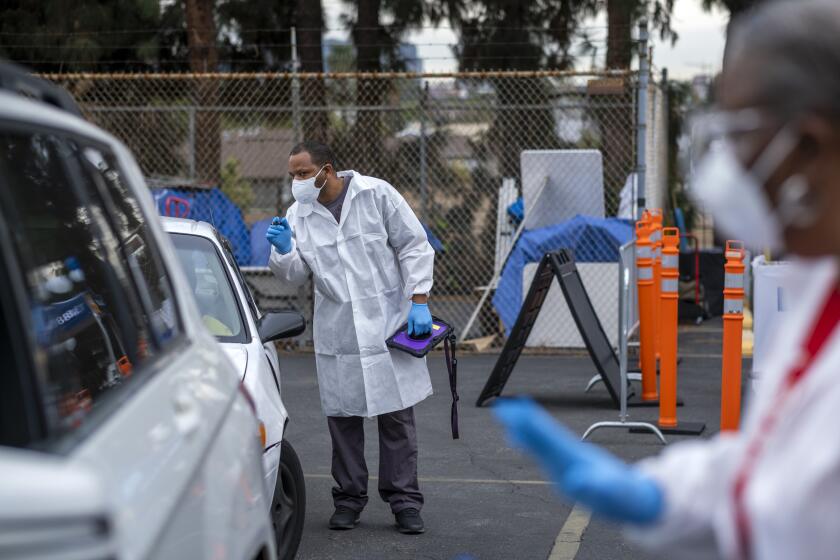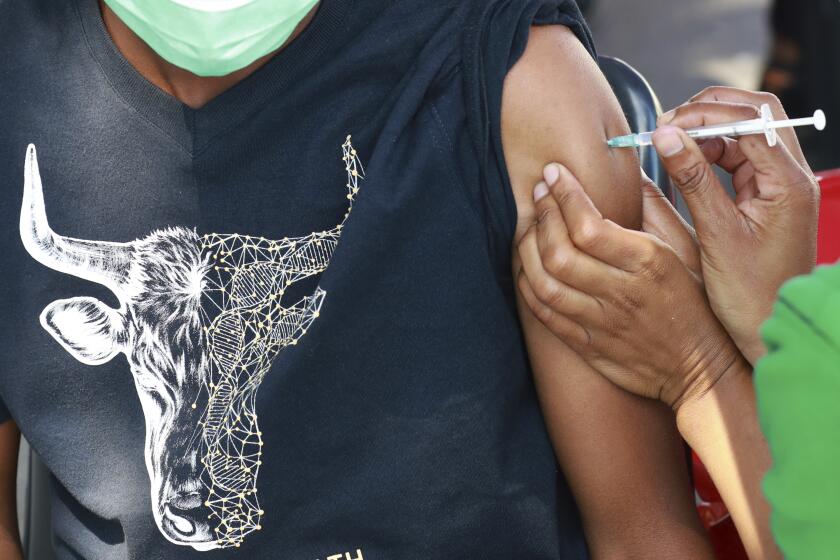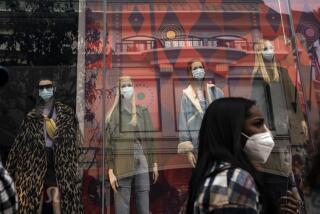Being ‘fully vaccinated’ but not boosted doesn’t help against Omicron, study finds
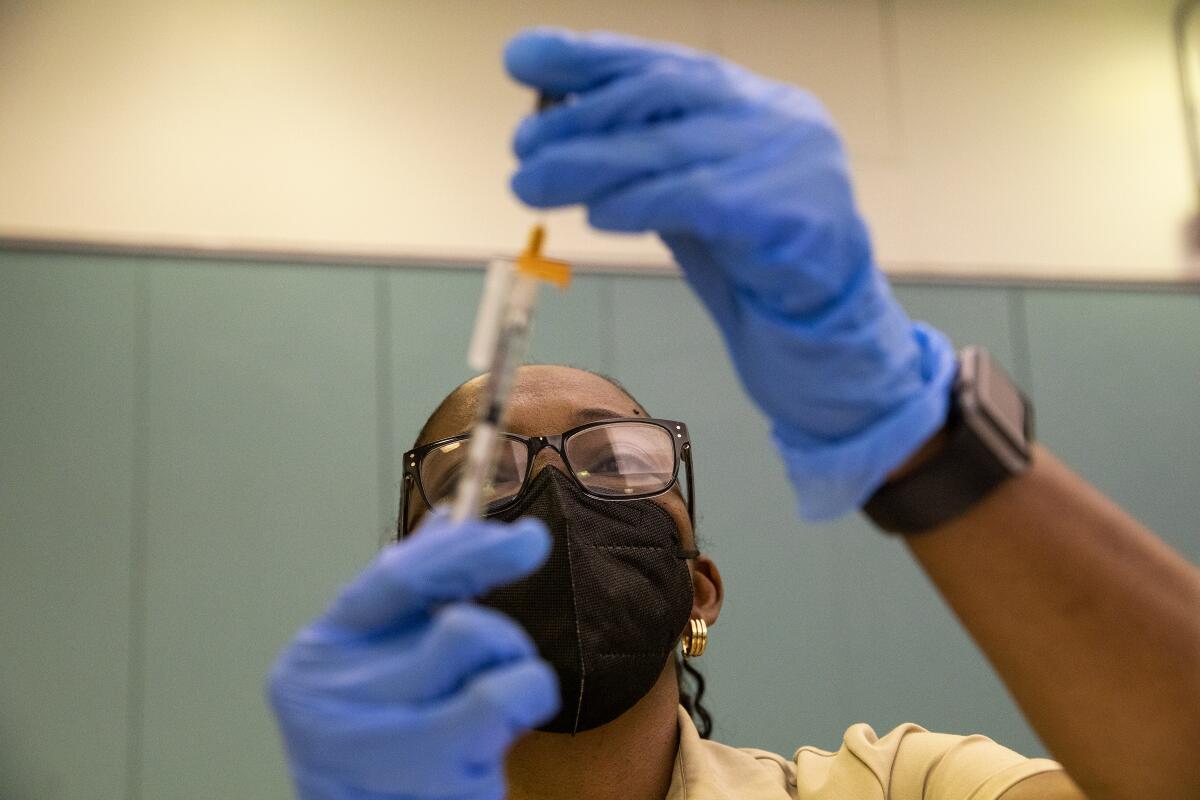
- Share via
Two shots of COVID-19 vaccine without an additional booster offer essentially no lasting protection against infection with Omicron, and a coronavirus infection is as effective as a recent booster shot in preventing a new Omicron-fueled illness, researchers reported Wednesday.
At the same time, any immunity to the highly contagious variant, either from infection or vaccination, appears to offer significant and lasting protection against serious illness, hospitalization and death, the researchers found. And if you haven’t had either the virus or the vaccine, doctors urged, it’s better to get the jab.
The results, published in the New England Journal of Medicine, provide some of the best understanding to date on the longevity of different types of coronavirus immunity and offer insight into the future of the pandemic.
“COVID-19 is going to stay with us essentially forever. It’s not really going to disappear. But the question will be: Will we be able to live with it somehow?” said Laith Jamal Abu-Raddad, an infectious disease epidemiologist at Weill Cornell Medicine-Qatar and a co-author of the study. “And the initial results we are getting are actually very encouraging.”
The study is the latest of several examining countrywide data from Qatar, the small Middle East nation with just under 3 million people.
Qatar’s population is considerably younger than most developed countries’ — just 9% of residents are older than 50, compared to about 35% in the U.S. It’s also more diverse, given than 89% of its residents are expatriates from 150 other nations. The country also has a robust coronavirus testing program, a high COVID-19 vaccine uptake and a centralized public health database that provides researchers with clean, clear data to analyze the effects of the vaccines over time.
What accounts for BA.2’s recent success? It’s not due to an ability to evade the protection of COVID-19 vaccines, a new study finds.
For this most recent study, researchers looked at data as the Omicron subvariants known as BA.1 and BA.2 tore through the country’s population from late December to late February.
They found that people who had received both shots of either the Comirnaty vaccine from Pfizer and BioNTech or the Spikevax shot from Moderna when they first became available but then neglected to shore up their immune systems with booster shots had essentially no protection against a mild to moderate case of COVID-19. Six months after their last shot, they were just as susceptible to a positive test and disease symptoms as anyone else — but still showed strong resistance to severe illness.
A prior infection was about 46% effective at preventing a symptomatic infection. Being fully vaccinated and boosted was about 52% effective. And having natural immunity from a prior infection as well as immunity from a vaccine and booster was the most effective of all, reducing COVID-19 risk by 77%.
Those figures represent a steep decline from the vaccines’ early days, when clinical trials showed they were 94% to 95% effective at preventing even mild illnesses. But as the coronavirus accumulates mutations, the vaccines become less effective at recognizing the virus and blocking infections.
“The immune evasion is so much higher” with Omicron, Abu-Raddad said. It is “essentially a new virus.”
A second booster is especially important for those 65 and older, and those 50 and older with underlying medical conditions, officials say.
The passage of time since the last boost of immunity from either an infection or a shot also erodes the body’s resistance to the kind of infection that elicits noticeable symptoms and a second pink line on a home test.
“However,” Raddad said, “and I think this is really the important part: The immunity against severe COVID-19 was really very much preserved.”
It may sound like a past infection is just as useful as a vaccine at countering Omicron, but doctors have an unambiguous preference: Get the shot, not the virus.
“It’s definitely much, much safer to get vaccinated than to get infected,” said Dr. Jeffrey Klausner, an infectious disease specialist at USC’s Keck School of Medicine.
“The vaccine is only presenting a small piece of the virus,” Klausner said. “The whole virus, if you get infected, is going to spread throughout the body, it’s going to cause different symptoms in different body parts and increase your risk for long COVID or a prolonged duration of illness.”
The virus is mutating rapidly and is likely to render vaccines and treatments less and less effective.
Previous studies have documented Omicron’s galling ability to evade existing vaccine antibodies.
The data from the Qatar group adds to that work by shedding light on the longevity of immunity, said Dr. Robert “Chip” Schooley, an infectious disease specialist at UC San Diego. “They’ve done a much better job of understanding the decay of the immune response over time than we have” in the U.S., he said.
“Getting COVID right now — if you’re vaccinated up and you’re reasonably healthy — is more of a nuisance than it is a life-threatening event for most people,” Schooley said. “It’s a very different disease from two years ago, when we had a largely non-immune human population, and a virus that was going at you for the first time.
“Now we have a virus that many of us have either seen through vaccination, or through infection, or a combination of both,” he added. “The playing field is much more level.”
